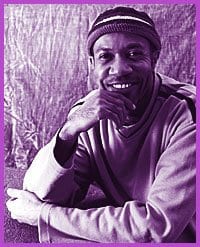After walking in the deserts of Arizona with a friend, Toronto lawyer Phillip Pike woke up one morning and decided to become a filmmaker.
It was 1998, seven years after being called to the bar. Pike says it was not a difficult decision to make – he’s always been a very creative person and since childhood, has had a keen interest in things celluloid.
His first video, Songs Of Freedom, a 75-minute long documentary on the lives of gay and lesbian Jamaicans will be screened on Sun, Jan 26 at the Bloor Cinema.
Pike may seem an enigma in the eyes of many. How does one give up a lucrative position as an attorney to become an artist with such passion?
Arriving in Canada from Jamaica in 1971 and moving to the Toronto neighbourhood of North York with his family, the young Pike didn’t suffer from culture shock. “I always liked adventure and travelling,” he says.
After his undergraduate studies at Laurentian University in Sudbury, a wide-eyed youth set off to Europe to teach, returning to Canada to pursue a law degree at McGill University in Montreal.
Outside of his immediate family, Pike was rarely around people of colour during his childhood and education. So when the opportunity arose to be on the board of the local AIDS group Black CAP in 1993, he seized it. “It was a deliberate and conscious step to the path towards a journey to self-discovery,” he says. Songs Of Freedom is a continuation of that path.
Pike was given a Super-8 video camera when he was 13; he recalls making home movies on a vacation in Jamaica. In 1998, Pike bought a video camera and again headed to Jamaica. That trip was followed up by classes at Trinity Square Video in Toronto.
According to Pike, his first video had to be about Jamaica. He says the island has always been in his heart, even if he was not conscious of it. “It’s like turning the lights off in a room and not knowing where the furniture is,” he says. “But you know it’s there.” Pike insists that as an artist he can only create from his experience and while he did not grow up in Jamaica, its ethos is still a part of who he is.
At the beginning of the project, Pike came out to his 84-year-old mother – who is quite supportive. For the first time, he struggled to have the word “homosexual” pass his lips en route to his mother. According to him it was the most difficult situation he ever had to face in his life.
Four years in the making, the documentary made Pike aware of the basic nature of the lives of Jamaican gay men and lesbians.
Here in Toronto, he is given labels: a gay Afri-Canadian, a black gay male and even a gay Jamaican Canadian. In Jamaica these dynamics don’t exist. There are simply same-gender-loving people living their lives in a hostile environment. While the uptown/ downtown, ghetto/rural di-chotomies do exist in Jamaica, the way of life of the people he interviewed encouraged Pike to see himself anew. Far too long he understood the world – and his place in it – through labels. The sheer fortitude of his queer Jamaican brothers and sisters allowed him to redeem his basic humanity.
Pike is a dreamer. When Pike heard the poem Walking In The Spirit Of My True Self by the gay African American poet Vincent Woodard, Pike immediately wanted the text to be a part of his film. The line “Dreams of black men’s bodies not for love,” conjured up images of slavery and the middle passage. For Pike, the poem was a link between Africa and African heritage in the diaspora. In a similar way, it forms a link between the dichotomies housed within same-gender-loving people.
Pike used to see himself as a closet Rastafarian because of his undying love for Bob Marley’s philosophy and music. One evening, after listening in depth to Marley’s “Redemption Song” Pike settled on the title Songs Of Freedom. “None but ourselves can free our mind,” sings Marley. “How long shall they kill our prophets while we stand aside and look.”
For Pike, the video’s title represents a celebration of life, whether among Jamaican gay men and lesbians or among straight men and women in Timbuktu. It is a journey of redemption and liberation, what Pike calls “a personal journey of the heart to love, love of ourselves.” And according to Joseph, one of the film’s interviewees, “It is only until we love ourselves, we can begin to love others.”
SONGS OF REDEMPTION.
$10. 4:30pm. Sun, Jan 26.
Bloor Cinema.
506 Bloor St.
www.jahloveboyproductions.com.

 Why you can trust Xtra
Why you can trust Xtra


